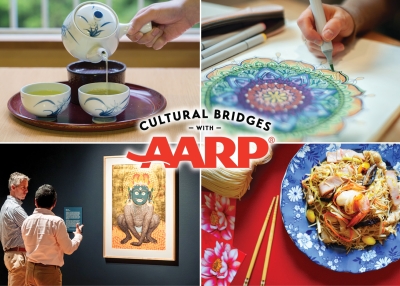Global Immigration Firm Chair Charles Foster Analyzes COVID-19 Impact on Immigrants, International Students
Asia Society at Home
Learn More
HOUSTON, May 8, 2020 — To discuss the impact of COVID-19 on immigrants, Asia Society Texas Center hosted a webcast with chairman of global immigration firm Foster LLP, Charles Foster, in conversation with Texas State Representative Gene Wu (District 137). The conversation touched on the myriad roles that immigrants are playing in today’s economy, how they are being affected by the coronavirus pandemic, and the impacts of the April 22 executive order on immigration.
Immigrants in the U.S.
Foster began at home, pointing out that Houston is a city of immigrants, with one in four Houstonians born outside the U.S. Nationwide, 24 percent of all nurses and 28 percent of all physicians are foreign-born, he said. But he indicated that the roles of immigrants go beyond the medical field. Immigrants representing all countries in the world are working at the bottom of the food chain — in jobs such as meat processing or in agriculture — as well as in some of the most complex jobs at the top of the food chain, including as engineers or Nobel Prize-winning scientists.
The U.S. has had some of the highest rates of legal immigration in the world, said Foster. Though the conversation around immigration often focuses on those who are undocumented, Foster emphasized that there is a spectrum of immigration statuses including individuals on temporary work visas and those who are legal permanent residents. Immigrants often come to the U.S. for a good education, receive practical training, and then seek employer-sponsored status for lawful permanent residency. He added that immigrants start more small businesses than any other group and are often leaders who create new industries and jobs, contributing to the strong U.S. economy in recent decades.
“Immigrants truly believe in the American dream,” said Foster. “They can come here, make a better life, and achieve what they couldn’t in their home countries.”
How are immigrants being affected by the coronavirus pandemic?
Foster noted that besides making up a large percentage of the workforce in industries deemed as essential for the pandemic response such as healthcare and agriculture, immigrants are also affected by new policy. He said the coronavirus pandemic has served as a justification for new immigration decisions by the administration, as seen by an executive order on April 22 that temporarily suspended some immigration for 60 days on the grounds of public health and growing unemployment.
Short of having immediate family members who are citizens, Foster said, H1B visas are the only way for people to get a foothold in the U.S. to begin working. Foster explained that applicants must be sponsored by an employer and show “essential skills” or “extraordinary ability,” and that it has essentially been a lottery system, with only about 65,000 H1B visas approved each year out of approximately 250,000 petitions from employers. Once approved, individuals can stay in the country only if they maintain status for six years and if the employer can prove shortage of willing U.S. workers.
Foster said the pandemic presented two problems for those immigrants. Firstly, though the initial executive order did not apply to H1B classifications, he said he is concerned that immigration restrictionists would seek to push a second executive order banning temporary worker visas and preventing individuals currently in the country from extending their H1B statuses. Secondly, the growing unemployment rate will make it difficult to prove a shortage of U.S. workers — required for the H1B extension — for the time being.
Who is affected by the April 22 executive order temporarily halting immigration?
Foster noted that the executive order signed by President Donald Trump to temporarily halt immigration for 60 days applies primarily to immigrants outside the U.S. seeking green cards. Temporary workers are exempted, as are healthcare workers. Nevertheless, Foster expressed concern about language in the order that called for additional measures in 30 days, which he said may indicate a second executive order that would affect H1B classification.
Foster added that EB-5 and E2 visas — granted to investors — are not affected by the executive order. Nor are international students on F1 visas. However, he noted that international students who returned to their home countries when universities in the U.S. closed would face difficulties returning. Moreover, those students would be barred from applying for Optional Practical Training — which allows foreign students studying in the U.S. to remain in the country for 12 months without being sponsored — as students are permitted to apply only while in the U.S. either 60 days before or following their graduation. In the current circumstances, those international students would no longer have a pathway to the H1B visa.
Do immigrants have access to government relief for COVID-19?
Under the current administration, Foster said that if immigrants use public services, that will be held against them in seeking a green card. This is known as the “public charge” provision. However, Foster noted that as the virus will spread irrespective of immigration status, the government has indicated that the public charge rule would not be applied for COVID-19 aid. Moreover, in order to encourage undocumented communities to seek medical assistance, the government would not enforce immigration laws at testing sites. He acknowledged it is unclear whether the affected communities were aware of those stances, or whether they would feel safe regardless.
Foster went on to note that, to the contrary, the CARES Act did not provide any relief to undocumented individuals or any immediate family members. He clarified the CARES Act's lack of coverage extended to U.S. citizens married to an undocumented citizen, children born in the U.S. to undocumented parents, and undocumented children brought to the U.S. at a young age by their parents — individuals whose statuses under President Barack Obama’s executive order, Deferred Action for Childhood Arrivals (DACA), are currently being challenged in court by the current administration.
The importance of immigrants
Throughout the program, Foster emphasized the importance of immigrants to the country. He challenged the argument that lower immigration would mean more jobs for U.S. citizens, pointing to the strong U.S. economy and low unemployment rates just three months ago. Three months ago, Foster said, the U.S. had high legal immigration as well as nearly 11 million undocumented workers. He argued that removing those immigrants from the workforce would have devastated the economy, dispelling the myth that the economy would not grow with immigration. Immigration in the long run helps our economy, Foster said.
Business and Policy programs are endowed by Huffington Foundation. We give special thanks to Bank of America, Muffet Blake, Anne and Albert Chao, ConocoPhillips, ExxonMobil, Nancy Pollok Guinee, United Airlines, and Wells Fargo, Presenting Sponsors of Business and Policy programs; Nancy C. Allen, Chinhui Juhn and Eddie Allen, and Leslie and Brad Bucher, Presenting Sponsors of Exhibitions; Dr. Ellen R. Gritz and Milton D. Rosenau and Wells Fargo, Presenting Sponsors of Performing Arts and Culture; and Mitsubishi Corporation (Americas), Presenting Sponsor of the Japan Series. General support of programs and exhibitions is provided by The Brown Foundation, Inc., The Hearts Foundation, Inc., Houston Endowment, Inc., the City of Houston through Houston Arts Alliance, McKinsey & Company, Inc., National Endowment for the Arts, Texas Commission on the Arts, Vinson & Elkins LLP, and Mary Lawrence Porter, as well as Friends of Asia Society.
About Asia Society at Home
Though Asia Society is temporarily closed, we are dedicated to continuing our mission of building cross-cultural understanding and uplifting human connectivity. Using digital tools, we bring you content for all ages and conversations that matter, in order to spark curiosity about Asia and to foster empathy.
About Asia Society Texas Center
With 13 locations throughout the world, Asia Society is the leading educational organization promoting mutual understanding and strengthening partnerships among the peoples, leaders, and institutions of Asia and West. Asia Society Texas Center executes the global mission with a local focus, enriching and engaging the vast diversity of Houston through innovative, relevant programs in arts and culture, business and policy, education, and community outreach.





